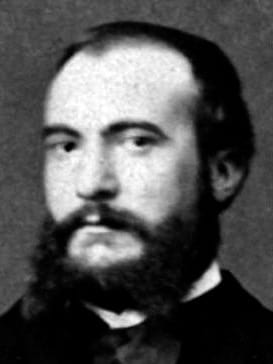Jules Cotard
Jules Cotard (1840-1889) was a French neurologist and psychiatrist.
Early career in neurology with a keen interest in cerebrovascular accidents and their clinical aftermath.
Cotard’s later publications contributed much to an understanding of the details of psychiatric symptoms. His publications described psychotic delusions; hypomania; bipolar psychosis; anxiety-depressive states; and severe hypochondriasis as a symptom of depression. He described delusions of grandeur, (délire d’énormité) to be manifest in psychotic patients with the “hyperbalism of language, of being superhuman”
Cotard’s name is eponymously associated with his description of patients with the syndrome of délire de négations – Cotard Syndrome (1882).
Jules Cotard also served as the real life model for the character of Dr. Cottard in the Marcel Proust novel In Search of Lost Time.
Biography
- Born on 1 June 1840 Issoudun, France
- 1863 – Graduated medicine from the Faculté de Médecin in Paris
- 1864 – Intern at Le Salpêtrière under Jean-Martin Charcot (1825–1893) and Alfred Vulpian (1826–1887) and became interested in ”the gamut of nervous diseases and madness in its multiple forms”
- 1868 – Prize for Medicine and Surgery of the Société de Biologie for joint paper presentation with Charcot on “A Case of Herpes of the Neck with Alteration of the Nerves of the Cervical Plexus and Ganglion Corresponding to the Posterior Spinal Roots.”
- 1868 – MD, Paris with Étude sur l’atrophie partielle du cerveau
- 1870 – Physician; infantry regiment of the French Army in the Franco-Prussian War
- 1871 – Physician in a clinic run by Ernest-Charles Lasègue (1816-1883) treating the psychiatrically ill and sick poor referred by the gendarmerie “from all corners of Paris.”
- 1874 – General physician in large clinical practice in Vanves, Paris where he worked for 15 years until his death.
- Died 19 August 1889 due to diphtheria contracted whilst nursing his infected daughter
Medical Eponyms
Cotard Syndrome (1882) [Cotard delusion]
A rare condition characterized by nihilistic delusions, where a patient believes that they are dead, have missing organs, or have decaying or failing body parts. The other prominent symptoms in a patient with Cotard syndrome are depressed mood (89% of cases), anxiety (65%), delusions of guilt (63%), delusions of immortality (55%) and hypochondriac delusions (58%)
Cotard syndrome can result from both psychiatric and neurological disorders. It has been observed in depression, schizophrenia, bipolar affective disorder, traumatic brain injury, cerebrovascular disease, brain neoplasm, multiple sclerosis, and encephalitis. Treatment options include the use of antidepressants, mood stabilisers, antipsychotics and electroconvulsive therapy.
Key Medical Attributions
Cotard published animal research and autopsy reports on brain atrophy, thrombosis, and atheromatous degeneration of cerebral arteries. Along with Prévost, and under the guidance of Charcot and Vulpian, he extrapolated the embolic consequences in animals to the sequelae (cerebral infarction) they observed in human beings. He was one of the first physicians to induce cerebral atrophy by the experimental embolization of cerebral arteries in animals.
Cotard made significant contributions to the studies of the clinicopathologic correlates of cerebral atrophy secondary to perinatal and postnatal pathologic changes and to the studies of altered conscious states in diabetic hyperglycemia
In Cotard’s eulogy, Antoine Ritti described how Cotard had founded the famous adage in jurisprudence, ‘Testis unus, testis nullis [a single observation is of no greater significance than no observations at all]. Cotard taught that changing (and reversible) mental changes were associated with diabetes (hypoglycaemia/hyperglycemia) and that caution was needed in any pronouncements after single observations of patients with altered mental states; specifically those with acute psychotic symptoms
Only universal goodness and integrity is able to establish in us that mental harmony which leads to internal peace
Cotard 1891
Major Publications
- Prévost J-L, Cotard J. Études physiologiques et pathologiques sur le ramollissement cérébral. Paris: Delahaye. 1866
- Cotard J. Étude sur l’atrophie partielle du cerveau. Paris: 1868
- Cotard J. Délire hypochondriaque dans une forme grave de la mélancolie anxieuse. Annales médico-psychologiques. 1880; 4: 168-174
- Cotard J. Du délire des négations. Archives de neurologie, 1882; 4: 152-170, 282-296 [Cotard delusion]
- Cotard J. Études sur les maladies cérébrales et mentales. Paris: Baillière. 1891
Fun Facts
Jules Cotard served as the real life model for the character of Dr. Cottard in the Marcel Proust novel In Search of Lost Time.
References
Biography
- Ritti A. Eloge du Docteur Jules Cotard. 1894
- Semelaigne R. Jules Cotard. In: The pioneers of French psychiatry before and after Pinel. 1932; 2: 237-241
- Walusinski O. Jean-Martin Charcot’s house officers at La Salpêtrière Hospital. Front Neurol Neurosci. 2011;29:9-35
- Bibliography. Cotard, Jules 1840-1889. WorldCat Identities
Eponymous terms
- Berrios GE, Luque R. Cotard’s delusion or syndrome?: a conceptual history. Compr Psychiatry. 1995 May-Jun;36(3):218-23.
- Pearn J, Gardner-Thorpe C. Jules Cotard (1840-1889): his life and the unique syndrome which bears his name. Neurology. 2002 May 14;58(9):1400-3.
[cite]
Psychiatrist in the making


